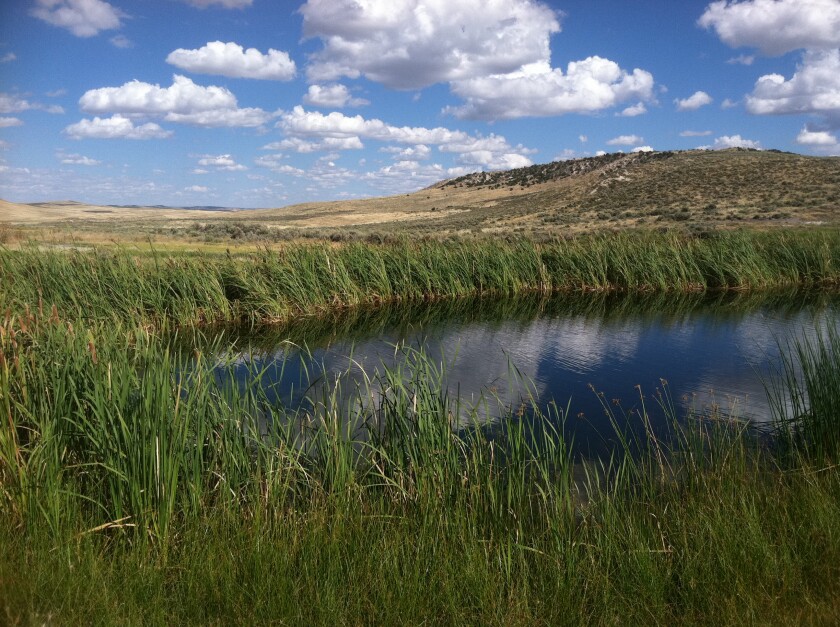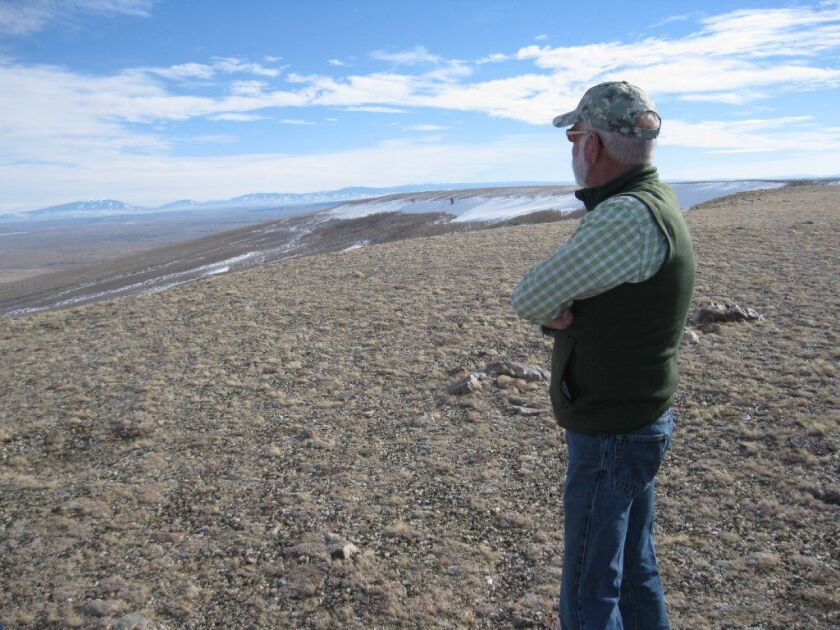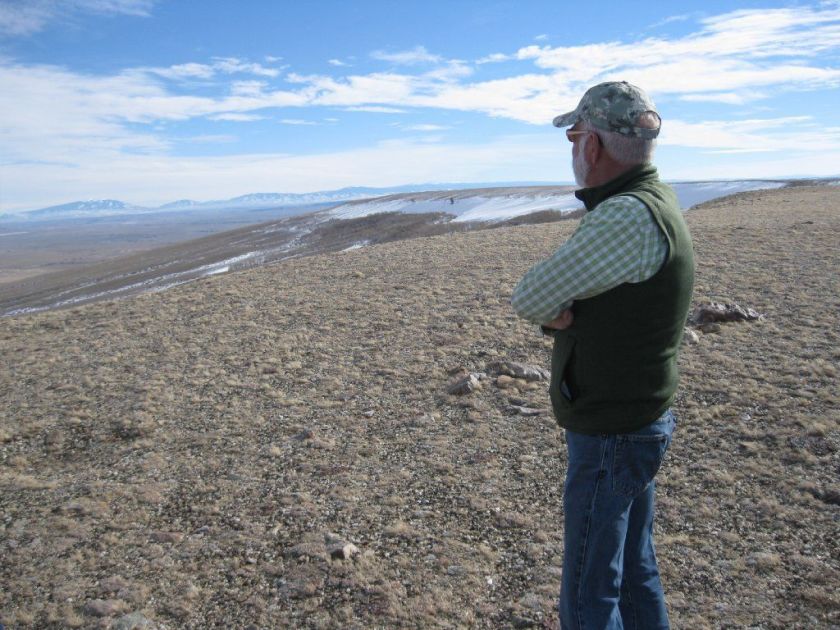How a federal agency is blocking America’s largest wind farm
from LA Times
BY SAMMY ROTH
This is the Aug. 5, 2021, edition of Boiling Point, a weekly newsletter about climate change and the environment in California and the American West. Sign up here to get it in your inbox.
Way back in 2019, I asked an energy company owned by one of America’s richest individuals to alert me when they were down to one final landowner standing in the way of their plan to send massive amounts of wind power from Wyoming to California.
It had been a dozen years since Phil Anschutz first proposed to build the country’s largest wind farm, as well as a 730-mile transmission line to ferry the clean electricity toward the West Coast. Federal officials had signed off on the power-line route, but Anschutz Corp. still needed to work out financial arrangements with hundreds of private landowners whose properties the towers and wires would cross. I was interested in writing about the final holdout along the route, if the project got that far.
This week, company officials finally had an answer for me. They said the last landowner standing between California and an infusion of climate-friendly power will be a family of Colorado ranchers — working closely with a federal agency.
That’s right: Even as President Biden urges Congress to fund a rapid buildout of clean energy infrastructure to fight climate change, an arm of his administration is helping to block the country’s largest renewable power project.

It’s a conflict that illustrates the difficulty of quickly transitioning away from fossil fuels, especially given the opposition to solar farms, wind turbines and transmission lines that has bubbled up in communities across the West. That opposition is motivated at times by aesthetic concerns and at times by a desire to protect animals and ecosystems from industrial energy development.
Let’s back up a minute.
Anschutz got rich drilling for oil in the Intermountain West decades ago. Today he owns or holds major stakes in the Los Angeles Lakers, L.A.’s Staples Center and the Coachella Valley Music & Arts Festival. Forbes estimates his net worth at $10.1 billion.

Since 2008, Anschutz Corp. has spent more than $400 million permitting and preparing to build 1,000 wind turbines on a giant ranch in south-central Wyoming, as well as hundreds of miles of electric wires that would cross through Colorado, Utah and Nevada, ending near Las Vegas. As I’ve written previously, the wind in Wyoming peaks in the afternoon and stays strong into the evening, meaning it could help California keep the lights on after sundown — a challenge recently, as you may have heard.
It sounds like an easy win for California, Wyoming and our planet’s climate. But here’s where things get complicated.
A small handful of landowners are still haggling with Anschutz Corp. over how much they ought to be paid to allow TransWest Express to cross their properties. The company tells me it expects to be able to resolve its issues with every landowner except one: Cross Mountain Ranch, an enormous sheep and cattle operation in northwest Colorado.
Under normal circumstances, Anschutz Corp. might try to invoke eminent domain. But several years ago, the National Resources Conservation Service — an agency within the federal Department of Agriculture — spent $3.3 million to help fund a “conservation easement” across 16,000 acres of Cross Mountain Ranch. In exchange for that money, the landowning Boeddeker family agreed not to sell any of the ranch to a developer who might build homes (or anything else). Power lines wouldn’t be allowed.

Conservation easements are meant to preserve rural economies dependent on agriculture, while also protecting farm and ranch lands that provide wildlife habitat. At Cross Mountain Ranch, federal officials said an easement would support the greater sage grouse, an iconic Western bird whose sagebrush habitat has been decimated by residential and industrial development.
“This became quickly one of the highest-priority sage grouse initiative projects in the country, because of the size, the connectivity to the public lands,” said Erik Glenn, executive director of the Colorado Cattlemen’s Agricultural Land Trust, which helped broker the Cross Mountain Ranch easement. “It’s a pretty pivotal migration corridor for mule deer, for elk… You’re frequently going to see sandhill cranes along the Yampa and Little Snake rivers in their migration periods.”
Anschutz’s TransWest subsidiary sued the Department of Agriculture in 2019, arguing that the National Resources Conservation Service violated federal law and its own policies when it approved and funded an easement that would block the planned power line. The company wants a judge to throw out the easement. Department of Agriculture officials have countered that they followed the law and were totally in the right to prioritize conservation, regardless of how it might affect the energy project.
Here’s the key point: Regardless of who wins in court, this battle illustrates a tension that is only getting more pressing as America hurries to confront the fires and floods of the climate crisis.
I’m referring to the tension between building renewable energy infrastructure and protecting ecosystems, which I’ve written about extensively. President Biden wants the United States to get 100% of its electricity from climate-friendly power sources by 2035. He’s also endorsed a campaign by scientists and advocates to protect 30% of America’s lands and waters by 2030.
There are ways to meet both of those goals, and they most likely involve carefully studying which landscapes ought to be fully protected and which can be set aside for development. But those strategies won’t resolve every conflict. There will always be difficult value judgments about the appropriate balance between conservation and fighting climate change.
For Anschutz Corp., the facts on the ground at Cross Mountain Ranch clearly weigh in favor of climate. The company points out that its transmission-line corridor would take up just 30 acres of the 16,000-acre conservation easement, and would allow for the delivery of enough wind energy — 3,000 megawatts — to power nearly two million homes.
U.S. Agriculture Secretary Tom Vilsack — who served in that role under President Obama, and now again under Biden — has actually praised TransWest Express, along with six other power lines selected by the Obama administration for accelerated permitting a decade ago. Vilsack said the projects would “help to meet our country’s electric needs in the 21st century.”
“These infrastructure projects will also create jobs and opportunities that will strengthen our economy to benefit households and businesses throughout the country,” Vilsack said in a written statement in 2011.

I also asked Glenn, from the Colorado land trust, whether sacrificing 30 acres out of 16,000 for a power line would really be that big a deal. He pointed me to research suggesting transmission infrastructure can harm sage grouse.
“We’ve got a policy priority of increased renewable energy, and we have a policy priority of increased conservation. Those two are going to continue to butt heads,” he said. “We have to find ways to resolve those conflicts.”
I also reached out to the owners of Cross Mountain Ranch. A 2017 Denver Post story described the property — which had been put on the market at the time, although it hasn’t sold — as “the rural family compound of the late Ronald Boeddeker, the Southern California real estate tycoon renowned for luxury developments like Lake Las Vegas and Waikoloa Beach Resort in Hawaii.”
Boeddeker’s son Matt didn’t respond to my interview requests. But he definitely opposes a transmission line. In a 2019 email cited by TransWest’s lawsuit, he wrote to a Natural Resources Conservation Service official that his family “agreed to permanently restrict (from development and for the protection of important wildlife) a very large part of one of the largest private ranches in Colorado in exchange for the govts part in full protection against power lines and other damaging items of development.”
“It’s impossible for this power line to happen if you take actions,” he wrote.
It’s hard for me to say if TransWest Express and the accompanying wind farm would really be canceled if the company’s lawsuit fails. Anschutz has spent hundreds of millions of dollars and a dozen years on these projects, and construction hasn’t even begun. I wouldn’t be surprised if he were willing to throw some more money and time at rerouting the power line.
I should note that the Department of Agriculture didn’t grant an interview request or respond to several questions I sent them.
I should also note that another company owned by one of America’s wealthiest individuals — the electric utility PacifiCorp, a subsidiary of Warren Buffett’s Berkshire Hathaway empire — also wants to build a transmission line, known as Gateway South, along the same route through Cross Mountain Ranch as Anschutz. PacifiCorp has its own legal action pending over the conflict.

